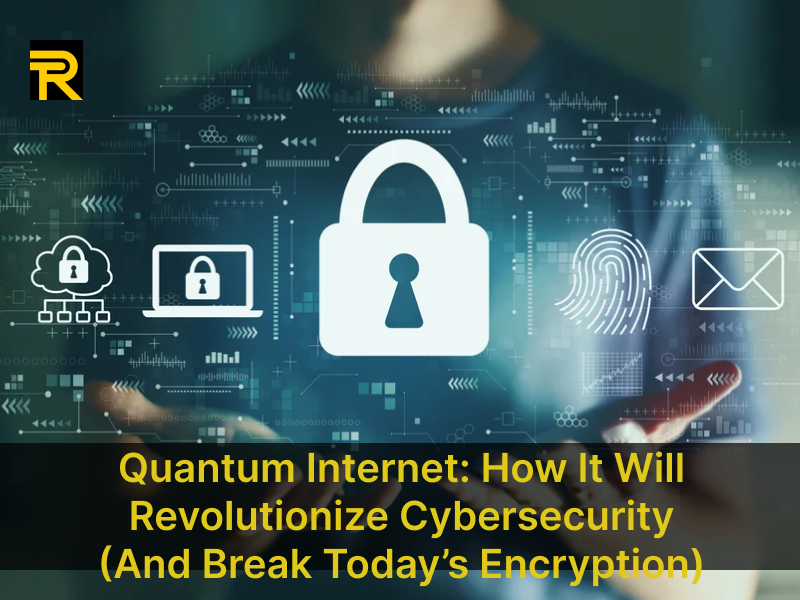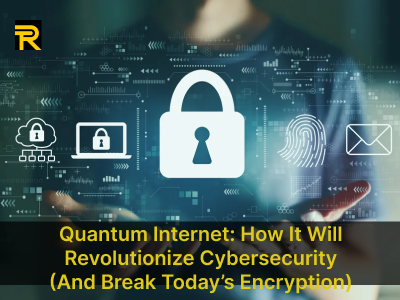
Quantum Internet: How It Will Revolutionize Cybersecurity (And Break Today’s Encryption)
The quantum internet is no longer science fiction—it’s an emerging reality that promises to redefine cybersecurity, encryption, and global communication. Unlike traditional networks, the quantum internet leverages the principles of quantum mechanics to enable ultra-secure data transfer through quantum key distribution (QKD). However, this revolutionary technology also poses a threat to current encryption methods, making post-quantum cryptography a necessity.
In this guide, we’ll explore how the quantum internet works, its cybersecurity implications, and what individuals and organizations can do to prepare. From quantum-safe VPNs to DIY quantum-resistant encryption tools, we’ll cover everything you need to know about this next-gen technology.
Quantum Key Distribution Explained Simply
At the heart of the quantum internet is quantum key distribution (QKD), a method that allows two parties to share encryption keys with theoretically unbreakable security. Here’s how it works in simple terms:
-
Quantum Entanglement: Photons (light particles) are linked in such a way that measuring one instantly affects the other, even across vast distances.
-
Heisenberg’s Uncertainty Principle: Any attempt to eavesdrop on a quantum-encrypted message alters its state, alerting the sender and receiver.
-
Unhackable Communication: Unlike classical encryption, which relies on mathematical complexity, QKD is secured by the laws of physics.
This makes quantum key distribution a game-changer for industries like banking, government, and defense—where data breaches could be catastrophic.
Best Quantum-Safe VPNs for 2024
As quantum computers advance, today’s encryption could become obsolete. To stay ahead, cybersecurity experts recommend using quantum-safe VPNs that incorporate post-quantum cryptography. Some top options for 2024 include:
-
ProtonVPN (with post-quantum encryption support)
-
NordVPN (testing quantum-resistant protocols)
-
Mullvad VPN (open-source, privacy-focused with future-proofing in mind)
These VPNs integrate lattice-based and hash-based cryptography to resist quantum hacking, ensuring your data remains secure even against future threats.
China’s Quantum Satellite Network Exposed
China has taken a massive leap in quantum internet development with its Micius quantum satellite, the world’s first quantum-encrypted communication network. Key revelations:
-
Global Quantum Communication: The satellite enables QKD between ground stations over 1,200 km apart.
-
Military & Government Use: China is already using this tech for ultra-secure military and diplomatic communications.
-
Potential for Surveillance: Critics warn that China’s dominance in quantum satellite networks could lead to unprecedented cyber-espionage capabilities.
This development accelerates the global race for quantum internet supremacy, with the U.S. and EU scrambling to catch up.
How to Prepare for Post-Quantum Cryptography
With quantum computers threatening RSA and AES encryption, organizations must transition to post-quantum cryptography (PQC). Here’s how to prepare:
-
Audit Current Encryption: Identify systems still relying on vulnerable algorithms.
-
Adopt Quantum-Resistant Algorithms: NIST has approved several PQC standards (e.g., CRYSTALS-Kyber for encryption, SPHINCS+ for signatures).
-
Upgrade Hardware & Software: Ensure your infrastructure supports hybrid encryption (classic + quantum-resistant).
-
Train IT Teams: Enroll in free quantum computing courses for developers to stay ahead.
DIY Quantum-Resistant Encryption Tools
For tech enthusiasts, experimenting with DIY quantum-resistant encryption tools is a great way to understand future-proof security. Some open-source projects to explore:
-
OpenQuantumSafe.org (implements PQC algorithms)
-
LibOQS (integration with OpenSSL for quantum-safe TLS)
-
PQClean (optimized implementations of NIST’s PQC finalists)
These tools allow developers to test post-quantum cryptography in real-world applications.
Risks of Quantum Hacking for Banks
Financial institutions face some of the biggest risks of quantum hacking:
-
Breaking RSA Encryption: Quantum computers could crack bank-grade encryption in seconds.
-
Blockchain Vulnerabilities: Bitcoin and other cryptocurrencies relying on ECDSA could be compromised.
-
Fraud & Data Theft: Hackers could decrypt decades of stored financial data.
Banks like JPMorgan and Goldman Sachs are already investing in quantum-safe cryptography to mitigate these threats.
Free Quantum Computing Courses for Developers
Want to get ahead in the quantum internet era? Here are some free quantum computing courses:
-
IBM Quantum Experience (hands-on quantum programming)
-
Qiskit by IBM (open-source quantum computing framework)
-
Microsoft’s Quantum Development Kit (Q# programming language)
These courses help developers transition into quantum-resistant software development.
Quantum Internet vs Traditional Fiber Optics
How does the quantum internet differ from conventional networks?
| Feature | Quantum Internet | Traditional Fiber Optics |
|---|---|---|
| Security | Unhackable (QKD) | Vulnerable to eavesdropping |
| Speed | Instantaneous (entanglement) | Limited by light speed |
| Scalability | Requires quantum repeaters | Easily expandable |
While quantum internet is more secure, it’s still in early development compared to traditional fiber optics.
EU’s Quantum Infrastructure Roadmap
The European Union is investing billions into quantum internet infrastructure, with key milestones:
-
2025: Pan-European QKD network
-
2030: Full-scale quantum internet integration
-
Focus Areas: Secure government communications, quantum cloud computing
This positions the EU as a leader in post-quantum cybersecurity.
Startups Building Quantum Repeaters
Since quantum signals degrade over distance, quantum repeaters are essential for long-range quantum internet. Leading startups in this space include:
-
Quantum Xchange (U.S.)
-
Qunnect (New York-based repeater tech)
-
QuTech (Netherlands, Delft University spin-off)
These companies are solving one of the biggest challenges in quantum internet deployment.
Conclusion: The Quantum Future Is Coming
The quantum internet will revolutionize cybersecurity—rendering today’s encryption obsolete while introducing unhackable quantum key distribution. Governments, banks, and tech giants are racing to adopt post-quantum cryptography, while startups develop quantum repeaters to enable global deployment.
To stay ahead, individuals should explore free quantum computing courses, while organizations must transition to quantum-safe VPNs and encryption. The future of secure communication is quantum—and it’s arriving faster than we think.
Follow Us
Trending News
Newsletter
Join us to get latest News Updates



